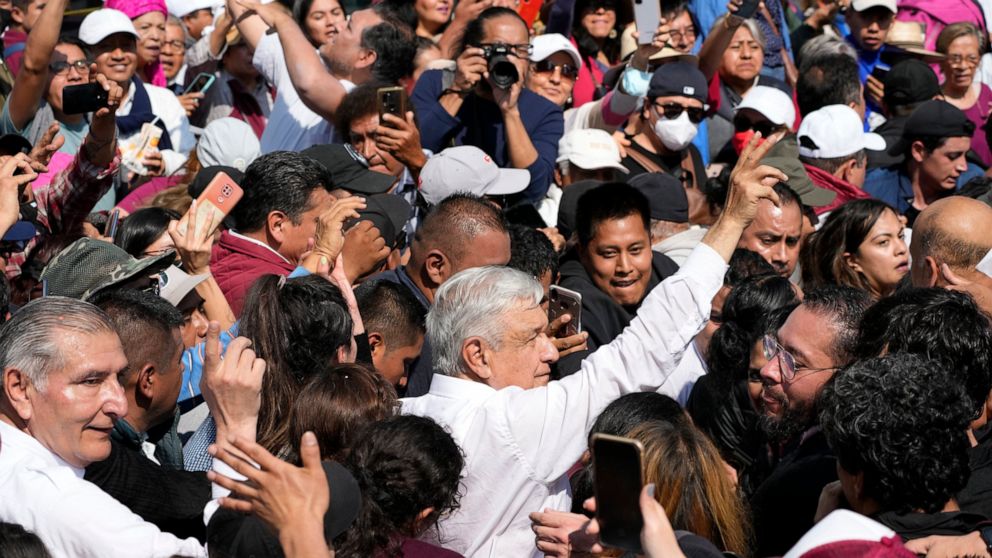(“Love is paid back with love” – President Andrés Manuel López Obrador)

The United States, under the Biden Administration, has held a tense relationship with Mexico as “disagreements over trade, foreign policy, energy, and climate change” have risen. America has a long history of calling out states on anti-democratic practices. The already tense relationship the United States shares with Mexico will pose the question of if the United States will act toward stopping the democratic backsliding in Mexico with its close geographical proximity and along with the public’s strong support for President Andrés Manuel López Obrador.
President Andrés Manuel López Obrador has recently sparked headlines as he marched alongside hundreds of thousands in Mexico’s capital Mexico City. The march, now called the “people’s march,” was led in response to the opposition march held two weeks ago, which protested President López Obrador’s proposal to reform the way the country’s electoral authority. While the President denies any accusations of forcing demonstrators to attend, others with the same ruling political party have pridefully shared their efforts of providing transportation to their constituents to “support the president.” A demonstrator expressing their support for the President showed his tattoos with the acronym “AMLO,” used for President López Obrador. On the other hand, others at the march against the President were clear in their criticism of the President, solely focused on his proposal for this electoral authority reform.
President López Obrador’s support is rooted in his “Fourth Transformation” campaign promise from 2018. The “Fourth Transformation” focuses on ending corruption, growing the Mexican economy, reducing violence, building infrastructure, and expanding social programs. Obrador has been known for his slogans “For the good of all, the poor first” and “Amore es pagado con amore.” The second slogan translates to “Love is paid back with love,” which may be a potent reminder that if his followers love and support him, they will be paid back accordingly.
The critics of President López Obrador attempt to raise the alarm for his proposal to overhaul INE, the country’s central electoral authority. The critics and protestors against this proposal fear the President’s proposal will allow for more centralized power for President and would politicize the INE, which is intended to be an independent and non-partisan institution. Reforms made to the INE would drastically change and “reduce the number of legislators in the lower chamber of Congress from 500 to 300 and senators from 128 to 96 by eliminating at-large lawmakers.” While the citizens do not elect those lawmakers, the citizens have a say in the number of seats taken by each party through a party’s portion vote. The critics against this proposal cite that if this proposal is not implemented, there will be a large blow to President López Obrador’s party, and there are potential consequences to the passage of making his “Fourth Transformation” possible. The President’s efforts to eliminate congressional offices in order to hold and concentrate power are increasingly alarming, granted his other actions that have led to democratic backsliding. The President has been known for his efforts to claim election fraud when it has suited him and has stated the critics are “corrupt.” The President’s “Fourth Transformation” has been a key reason for his overwhelming support for having him elected to serve. Still, in an effort of his agenda, he “has removed checks and balances, weakened autonomous institutions, and seized discretionary control of the budget.” As democratic backsliding continues, the pressure of what this proposal means for democracy rises.
As President López Obrador’s presidential term has two years remaining, the United States and other global leaders are met with an uphill battle to stop the democratic backsliding in Mexico even with the enamored citizens’ support for President López Obrador.

This blog post is a great example of democratic backsliding. President Obrador attempted to manipulate elections through institutional changes (reduce the number of seats and legislators), “election authority” in a way that will intentionally help win Obrador. This would not be considered “free and fair election” because institutional changes means that the election process would not be fair and free for the opposition parties. In addition, it is interesting how Obrador attempts to manipulate and align voters with his ideology by promising reward for voting him ” Love is paid back with love” slogan proves that the president would provide reward for the incumbents for helping win election. In this case, voters who have limited opportunities are more likely to support because they want to take advantage of the rewards even if it is for short-term. This is corruption and it would not be considered a fair election. Free and fair election, one of the democracy principles, would not be executed because it should be more competitive than manipulative. One of the reasons leaders engage in this practice is fear of losing power. In other words, if the opposition parties have mass support, then the regime could be under threat. Regimes survival continues through the engagement of illegal means ( unfair election process).
Despite this argument, the idea of whether U.S would help the election process in Mexico is skeptical. To be specific, non-democratic regimes would not allow foreign interference in domestic affairs as a legitimacy. In other words, Obrador could threaten the institutions more to secure his power. How would democracies end non-democratic regimes considering no foreign interference in domestic affairs? I mean international electoral observers could go see the election process, however, they do not have a legitimate power.